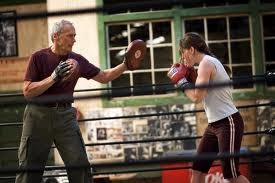




CLINT EASTWOOD (Director/Producer) most recently directed and produced
the drama “Changeling,” starring Angelina Jolie in the true story of an infamous 1928
kidnapping case that rocked the LAPD. The film was nominated for a Palme d’Or and
won a Special Award when it premiered at the 2008 Cannes Film Festival. In 2005,
Eastwood won Academy Awards® for Best Picture and Best Director – his second in
both categories – for “Million Dollar Baby.” He also earned a nomination
for Best Actor for his performance in the film. In addition, Hilary Swank and Morgan
Freeman won Oscars®, for Best Actress and Best Supporting Actor, respectively, and
the film was also nominated for Best Adapted Screenplay and Best Editing.
Nominated in 2004 for his direction of “Mystic River,” Eastwood took home his third Best
Director Golden Globe the following year for “Million Dollar Baby.” He was also
nominated in 2005 as the composer of the score for that film.
http://www.thegrantorino.com/assets/pdfs/GRAN_TORINO_Final_Notes_and_Bios.pdf Item 5
At this point in his career, when Clint Eastwood stars in and directs a film, all bets are off. Things that would be old-school and sentimental in other hands morph into something different when he is involved. If Tina Turner's motto is that she doesn't do anything nice and easy, Eastwood's would be that the ordinary is just not his style. Which brings us to "Gran Torino," Eastwood's second directing project this fall, his first work as an actor since 2004's "Million Dollar Baby" and a film that would be less interesting if he were not involved. Working from a script by first-time screenwriter Nick Schenk, Eastwood has, with his impeccable directing style and acting presence, turned "Gran Torino" into another in his ongoing series of films that ponder violence, its place and its cost. It combines sentiment and shootouts, the serious and the studio, in a way that has become distinctly Eastwood's own.
http://www.latimes.com/entertainment/news/reviews/la-et-torino12-2008dec12,0,2314630.story Item 6
If one thing is apparent, at least to those who’ve been following Clint Eastwood's career in recent years, it is that he’s taken a different approach lately as a director. Instead of taking big well-rounded splatter shots at Oscars, as was the case with Million Dollar Baby and Letters from Iwo Jima, he has taken to a more targeted approach. This trend was very apparent a few months back with Changeling. Eastwood made a solid, but relatively one dimensional film that was tweaked just enough to be a serious Oscar grab for Angelina Jolie. And had Jolie’s Oscar grabbiness not been so blatant, it might have worked.
We see a similar theme with Gran Torino, in which Eastwood plays on both sides of the camera as director and as Walt Kowalski, an iron-willed Korean war vet whose wife has recently passed away, leaving him alone in their old house surrounded by an ever-growing population of Hmong neighbors. And much to the dismay of Spike Lee, Walt is a staunch racist. We are talking blatant, irreverent and uncompromising racism here. Yet somehow it is still very tastefully done — only Clint can make that happen, of that I am convinced.
http://www.filmschoolrejects.com/reviews/review-gran-torino.php Item 14
Box Office Success-
Gran Torino Domestic Total Gross: $148,095,302, Production Budget: $33 million
Million Dollar Baby Domestic Total Gross: $100,492,203, Production Budget: $30 million
Changeling Domestic Total Gross: $35,739,802, Production Budget: $55 million
http://boxofficemojo.com Item 16
The success of "Gran Torino" could boost Eastwood's awards chances. The film was largely overlooked by the Globes, but the Oscars have long supported Eastwood's directorial efforts and awarded his "Million Dollar Baby" best picture in 2005.
http://today.msnbc.msn.com/id/28605623 Item 17
This will be used for the opening paragraph of the 'Success' topic of Clint Eastwoods directing abilities.
No comments:
Post a Comment